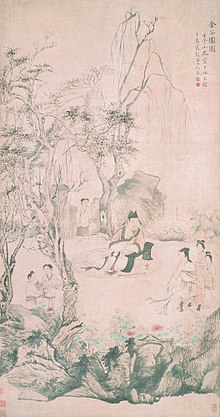Lüzhu

Lüzhu (simplified Chinese: 绿珠; traditional Chinese: 綠珠; pinyin: Lǜ zhū), also called Liang (died 300) was an Ancient Chinese dancer, singer and music teacher.[1]
She was bought by Shi Chong (249–300), an official of Emperor Wu of Jin, and became his concubine. She became famous for her artistry and beauty, as she entertained his guests as a singer, a flute player and a dancer. She also composed music, and made poetry into songs by composing music for it. The famous composition Aonao qu has been attributed to both her as well as to Shi Chong. When a representative from the Imperial court demanded to buy her, Shi Chong refused to sell. Shi Chong was then ordered to commit suicide, upon which Lüzhu herself committed suicide. Lüzhu is depicted in the Wu Shuang Pu (無雙譜, Table of Peerless Heroes) by Jin Guliang.
References
- ^ Lily Xiao Hong Lee, Clara Lau, A.D. Stefanowska: Biographical Dictionary of Chinese Women: Antiquity Through Sui, 1600 B.C.E
External links
(Chinese language) Lüzhu on the site of Baidu Baike
- 300 deaths
- 3rd-century Chinese people
- 3rd-century Chinese women
- Ancient dancers
- Ancient music composers
- Ancient singers
- Ancient slaves
- Chinese concubines
- Chinese slaves
- Chinese women singers
- Chinese women composers
- Jin dynasty (266–420) musicians
- 3rd-century Chinese musicians
- Suicides in the Jin dynasty (266–420)
